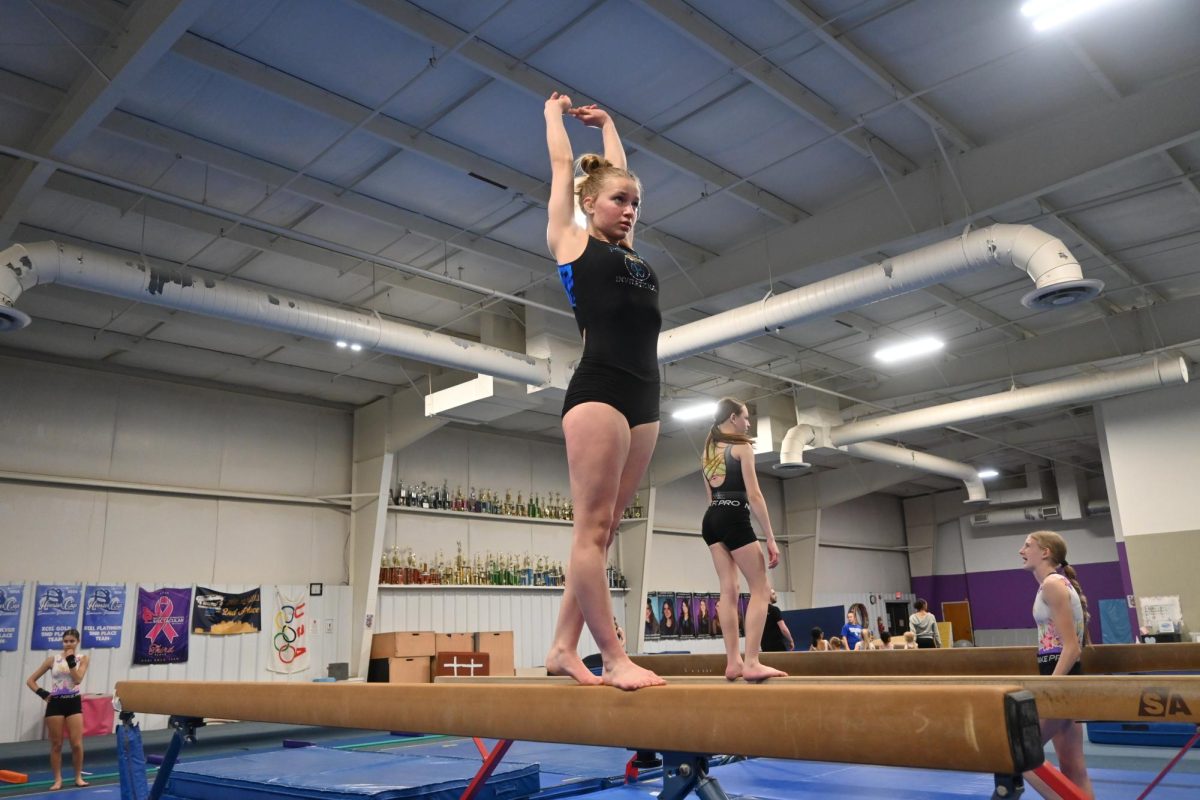The first time 6-year-old Lydia Hiller stepped into The Dance Refinery (TDR), she was overwhelmed with feelings of amazement, nervousness and excitement for a new experience. Now, as a highly-decorated junior, walking into practice feels like entering her second home. Still, that same sense of excitement has never faded.
“If little me had watched me now, I think she’d be pretty proud, and she’d be pretty excited to get to that point,” Hiller said. “That’s also one of the things that keeps me going, is (that) little me would’ve killed to be this good.”
Hiller has faced many successes and struggles but has persevered for her deep love for the sport, and she is now approaching a bittersweet final year to her gymnastics career.

 Early in life, Hiller’s bubbly personality and never-ending amount of energy were obvious, and her parents needed to find an outlet for their active child. Hiller’s mom, Dana Lynn, says her daughter was extremely flexible and sometimes even scared her with her tricks.“She used to do this thing, we called it the spider, where she would kind of lay her chest down on the ground and then flip her feet back over her head … and she started doing it more because she got attention for it,” Dana Lynn said. “So finally we were like, ‘Well, maybe we should put her in gymnastics just to see what happens.’”
Early in life, Hiller’s bubbly personality and never-ending amount of energy were obvious, and her parents needed to find an outlet for their active child. Hiller’s mom, Dana Lynn, says her daughter was extremely flexible and sometimes even scared her with her tricks.“She used to do this thing, we called it the spider, where she would kind of lay her chest down on the ground and then flip her feet back over her head … and she started doing it more because she got attention for it,” Dana Lynn said. “So finally we were like, ‘Well, maybe we should put her in gymnastics just to see what happens.’”
Hiller began her gymnastics journey at the YMCA at just 5 years old, but by age 6, she decided she wanted to do more than simple floor work and transitioned to the competitive setting of TDR.
After joining the competitive environment, she was introduced to the development levels of gymnastics, which range from one to 10. By her freshman year, Hiller already progressed to level nine, making her the highest-performing gymnast at TDR.Throughout her first few years at TDR, Hiller was luckily able to avoid gaining any serious injuries from the sport. However, that all changed during her freshman year, which she describes as the most difficult period of her career as a gymnast.
It was her first year as a level-nine competitor, and she lost her place during a major dismount and decided to bail. Instead of landing on her hands and knees as anticipated, she landed on her knees with her back arched, which sent a shooting pain through her spine. Despite this pain, she told herself she could push through it until she found herself unable to move her back at her next meet.
“I landed, and I couldn’t bend forward. I couldn’t really move my back at all without a shooting pain up my spine,” Hiller said.
She decided to take some time to rest before regionals, but she would still go to practice every day and participate in conditioning. She began to do more as the injury improved, but after an awkward floor pass, the pain immediately returned, which caused a major setback that prevented her from participating in the next state and regional competitions.
After months of physical therapy and conditioning, she had one week when she was able to perform at her normal level. But after falling off the beam during practice, she fractured a small bone in her wrist, which caused her to have to switch between wearing a brace and cast for six weeks, and once again, she was back to conditioning. By this point, she was frustrated with being unable to perform to the best of her abilities.

“I did some stuff, like I would tumble one-armed,” Hiller said. “I don’t know if that was really the best idea for me, but I just got so sick of not being able to do stuff that I was like, ‘I’m going to do anything I can.’”
By August of her sophomore year, Hiller had a short period of being back to full health until her last turn of a normal Wednesday night practice ended with her ankle rolling off of the mat onto the hard floor, causing her to be unable to practice normally once again.
“That was probably the one that hurt the worst,” Hiller said. “Immediately, I was on the ground sobbing.”
This myriad of injuries caused Hiller to be away from gymnastics for a total of six months. However, she still continued to go to practice every day to condition. Her time spent on the sidelines and watching her teammates do the activity she loves while she was unable left her discouraged and defeated.
“Every time I felt like ‘I’m finally getting back to where I was, and I’m finally getting to do the stuff I want to do again,’ I would get hurt again,” Hiller said. “I would just go home and cry.”
Despite these continuous setbacks, Hiller never gave up and worked with her coaches to adjust her training and make herself ready for competition once she was fully healed. Throughout this journey, she learned to be less intense with her practices and be more conscious of her actions.
Hiller’s primary coach, Brian Wesselman, has been a leading factor in her shift in thinking. Through consistent communication and a bit of disagreement, their relationship has become extremely trusting and cooperative.
“I try to save her from herself sometimes, but that just shows she really wants to work hard and doesn’t like being injured,” Wesselman said. “But she understands when … she does

The skill she spent most of her recovery time training on was bars, which was always one of her least favorite events, but she reluctantly tried it out to continue building on her temporarily-limited abilities. Today, it is her best event and one of her favorites.
Last year, Hiller was the level-nine state champion for bars. This year, she has won bars at all except for one meet where she placed second, leading her to become state champion once again this season.
“I think (it) shows her dedication and willing(ness) to try and then learn new things, and when things work out, she’s a pretty happy person,” Wesselman said.
 Even though TDR requires less practice hours than many competitive gyms, Hiller often struggles to handle her stress while balancing babysitting, DECA, challenging classes and 14.5 hours a week at the gym.
Even though TDR requires less practice hours than many competitive gyms, Hiller often struggles to handle her stress while balancing babysitting, DECA, challenging classes and 14.5 hours a week at the gym.
Her main method of managing her time has been to take a study hall every year and take advantage of every iPass and the hours between school and practice. She also finds gymnastics to be a well-needed break from the normal school routine.
“It’s a lot, but also I’m not willing to give up anything,” Hiller said.
Despite her struggles with stress and injuries, Hiller has never considered giving up on being a gymnast.
The activity was the first setting where she learned to work hard towards something and always push herself to continue moving up through improving her scores and persevering through her toughest obstacles.
“She still enjoys it a lot, but the last couple years she’s struggled more … so we’ve had more of those conversations of ‘Is it worth it? Do you still want to do this?’” Dana Lynn said. “And she always says yes.”
Additionally, the bonds she’s fostered with her teammates and her coaches are extremely important to her, whether they were formed through words of encouragement or bringing baked treats to practice.

“We’ve both grown into just very encouraging people,” Teevan said. “It’s really helped with us just loving gymnastics, I’d say, and keeping the love in the sport.” Since beginning gymnastics, Hiller has attempted other activities such as middle school cross country and diving, but nothing has ever compared to the “magic” of gymnastics.
“It’s like, sparkles,” Hiller said. “The sport as a whole, it’s like fairies and magic.”
Over the years, Hiller has collected dozens of awards, most of which she keeps in a drawer and her favorites she keeps on a medal rack.
She has various accomplishments including winning state and regional titles and qualifying for easterns, which is a competition including top performers from 25 states. However, Hiller says that the awards she feels best about are the awards given out by TDR, such as “most improved” and “hardest worker,” as well as her personal accomplishment of being at level nine.
Even with her devotion to gymnastics, Hiller says the activity won’t be a priority as she moves on to college. However, she will likely never completely leave her passion behind.
She has considered the possibilities of participating on a club team in college and trying out coaching or judging with her knowledge of the sport. But currently, she is beginning to experience the emotions that come along with ending an 11-year-long career.

“I’m going to be a puddle at my last meet,” Hiller said. “I can’t even think about it or I want to cry.”
Although her emotions are already strong, her career isn’t over yet. After becoming the overall level-nine state champion for the second year in a row, she hopes to raise the bar for the rest of her scores this year and by the end, gain a state, regional and eastern title.
As Hiller continues to push forward and work towards what may be the end of her gymnastics journey, she says is extremely appreciative to have been able to have an outlet to explore her personality, growth and energy all in one “sparkly” activity.
“At the end of the day, I’m just very grateful to have the opportunity to do it,” Hiller said.



